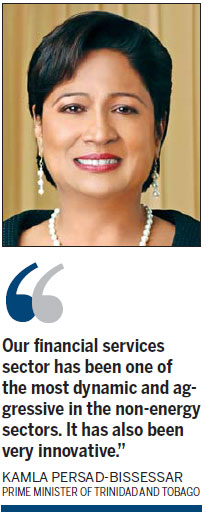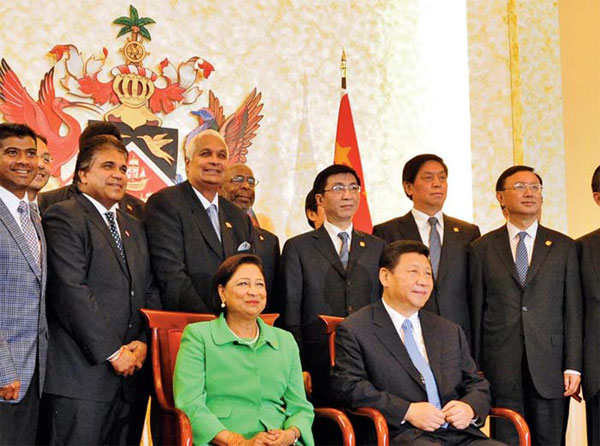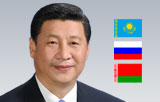A beacon for growth and stability
(China Daily) Updated: 2014-02-24 07:35With its wealth of energy resources, business-friendly nation offers warm welcome
With a strategic position close to South American markets, and as a potential hub for shipping and trade, Trinidad and Tobago, T&T for short, is reinforcing bilateral links with China.
An official visit from Chinese President Xi Jinping to the Caribbean archipelago in June last year, and T&T Prime Minister Kamla Persad-Bissessar's official visit to China this week are heralding the dawn of a strong and mutually beneficial partnership between the two nations.
|
The Prime Minister of Trinidad and Tobago Kamla Persad-Bissessar with Xi Jinping, the president of China. |
On Feb 26, Prime Minister Persad-Bissessar will be opening the new Trinidad & Tobago Embassy in Beijing.
Her visit also coincides with the celebration of the 40th anniversary of the establishment of diplomatic relations between the two countries.
During Xi's first visit to the country, he and T&T Prime Minister Kamla Persad-Bissessar agreed to enhance diplomatic exchanges and high-level visits; to actively promote cooperation in the fields of infrastructure, energy and mining, and to explore further cooperation in agriculture, fisheries, science and technology, investment and financing, telecommunications and new energy; to expand people-to-people exchanges, strengthen exchanges and cooperation in the fields of tourism and culture, especially creative industries, education, health, sports, journalism and personnel training, to support youth exchanges and set up a Confucius Institute in T&T at an early date; and to keep close cooperation on international affairs.
China will give positive consideration for providing energy-saving products to relevant Caribbean countries to help them enhance their abilities to adapt to and cope with the effects of climate change.
China already has a big presence in Trinidad in terms of oil exploration, through Sinopec and China National Offshore Oil Corporation, and this will increase with the expansion of the Panama Canal, which will allow easier exports of liquefied natural gas toward Asia. T&T received its highest ever foreign direct investment of $2.5 billion in 2012, 90 percent of which was in the energy sector. China has also donated $3.1 billion in concessional loans to the Caribbean Community countries, which has delighted the T&T Prime Minister, who will represent the CARICOM community when he visits Beijing for the embassy opening.
"I know our delegation is very happy to visit China and we again want to thank His Excellency and the people of China for visiting us. In fact, the president met with most of the heads of CARICOM for a very gracious concessional financing during his visit in June. We have made applications and there are several projects here that are being undertaken by Chinese firms."
Although T&T has been an oil and gas economy for over 100 years - the sector makes up 40 percent of GDP and 80 percent of exports -the government has launched a diversification drive which aims to create a more balanced economy.

As T&T Finance Minister Larry Howai explained: "Our financial services sector has been one of the most dynamic and aggressive in the non-energy sectors. It has also been a very innovative sector, pioneering in services like mobile and internet banking among others, as well as corporate banking. I expect they will continue to make a very positive and strong contribution to growth over the next few years.
"We have also been introducing new legislation that would have some tighter regulation of the industry and have been looking at a number of new initiatives. I think all of these will add to the dynamism of the sector."
T&T is also making great strides to develop its infrastructure. With around 700,000 cars to a population of 1.25 million people, congestion can be a problem.
As the country's primary construction management agency, the National Infrastructure Development Company, NIDCO for short, has played a key role in creating jobs and stimulating the national economy. The company supports government's plans for diversifying the economy away from the traditional energy sector.
According to NIDCO President, Dr. Carson Charles, "Diversification requires a complete re-thinking of the entire economic system, to achieve the level of productivity, and competitiveness required for long-term growth and development. However, oil and gas cannot be replaced by any one product or sector."
"A modern physical infrastructure platform is key to achieving economic transformation. We are currently building several highways to link the major economic centres in the country. We are also constructing infrastructure to deal with the perennial problems of flooding, erosion and land slippage," he added.
NIDCO undertakes major roads and bridges construction, transportation management, flood alleviation projects and management of the water taxi service. It regularly works with international companies and consultants on its projects.
"We recruit the best people available for project management and have formed a number of joint ventures with foreign companies and consultancies."
InFocus provided the story
(China Daily 02/24/2014 page18)




